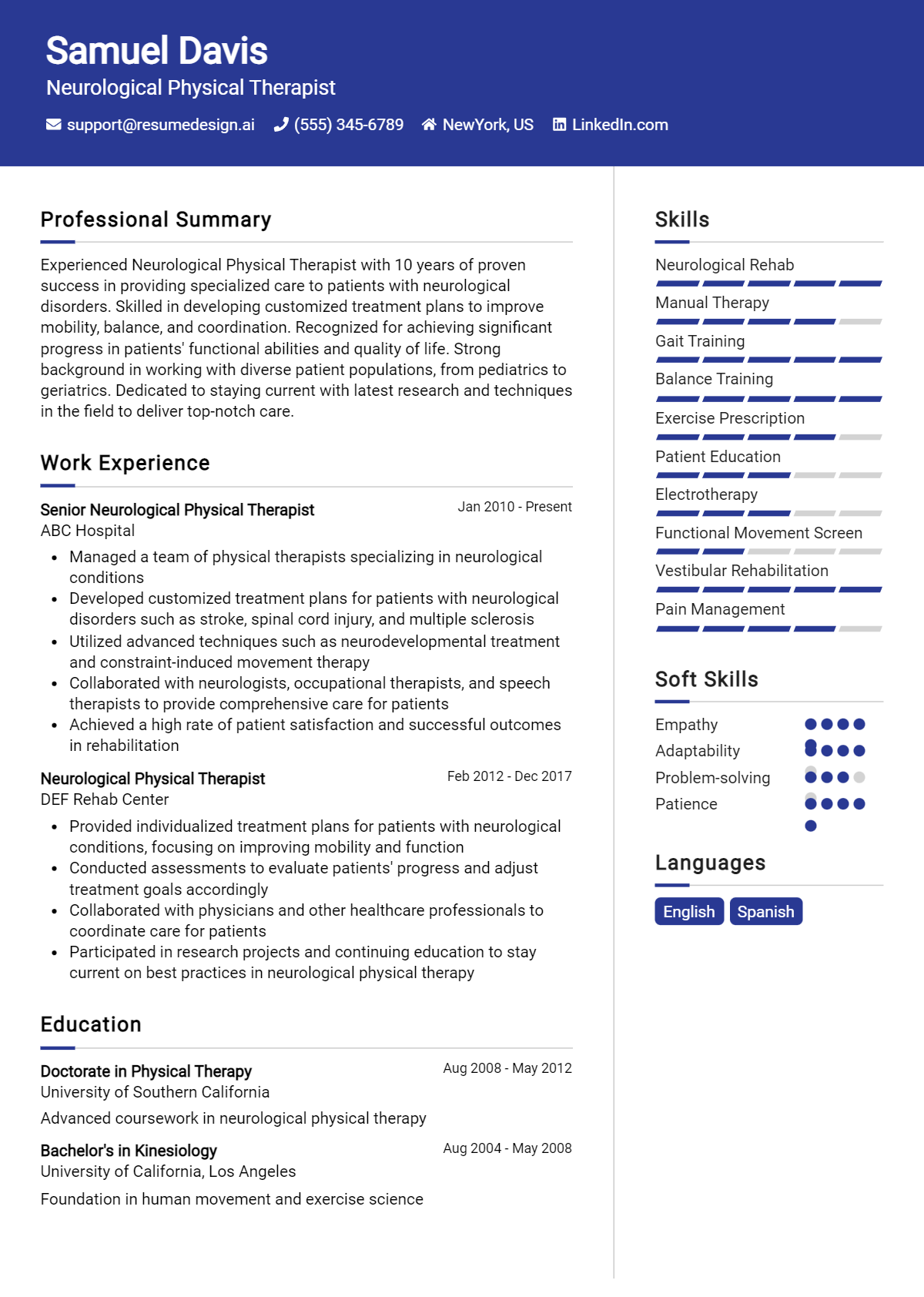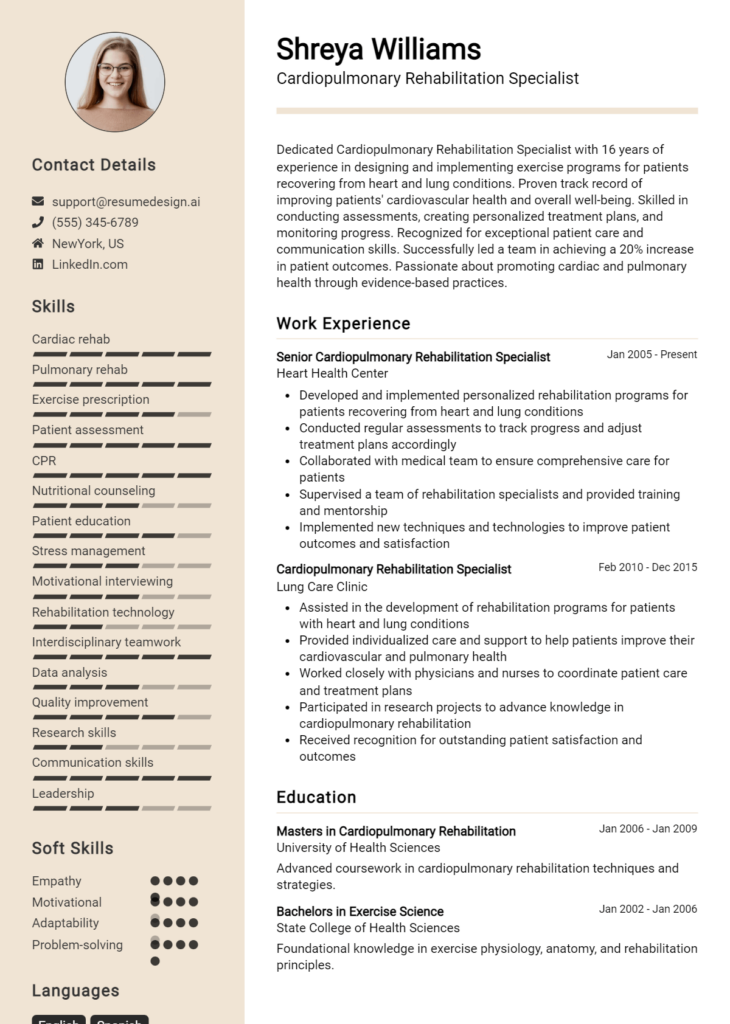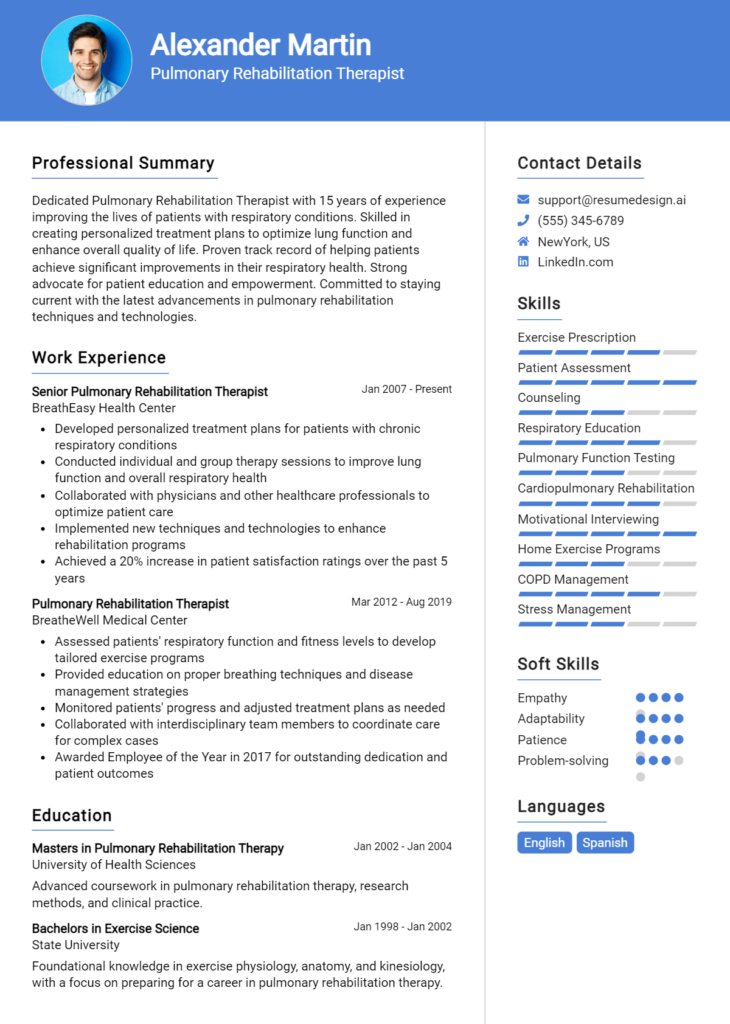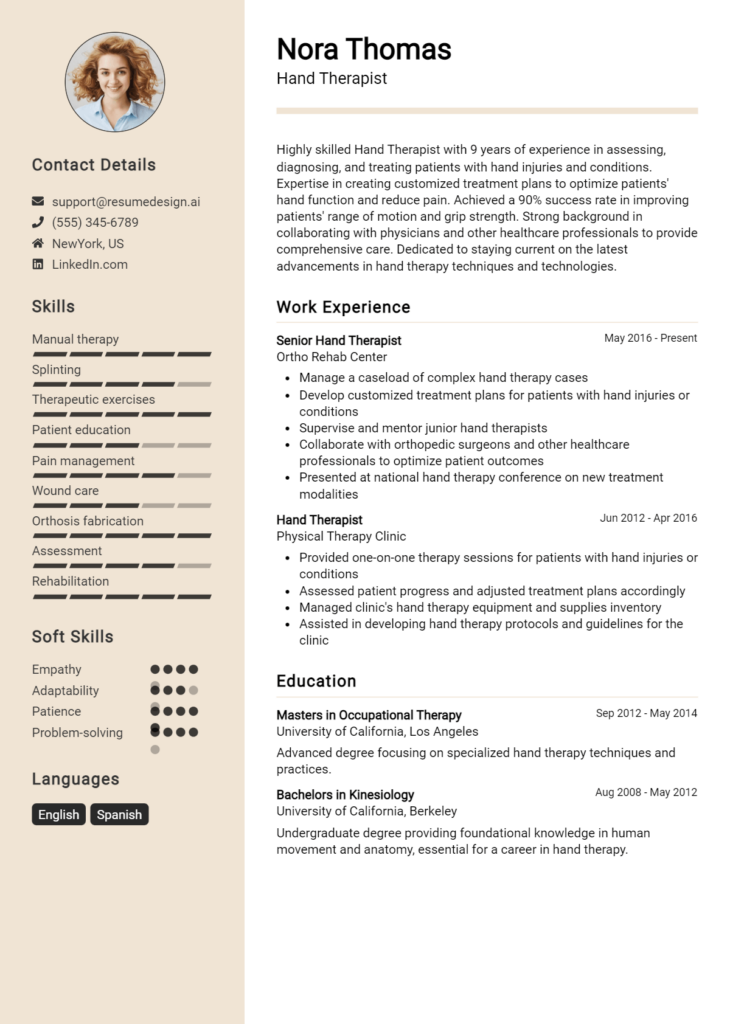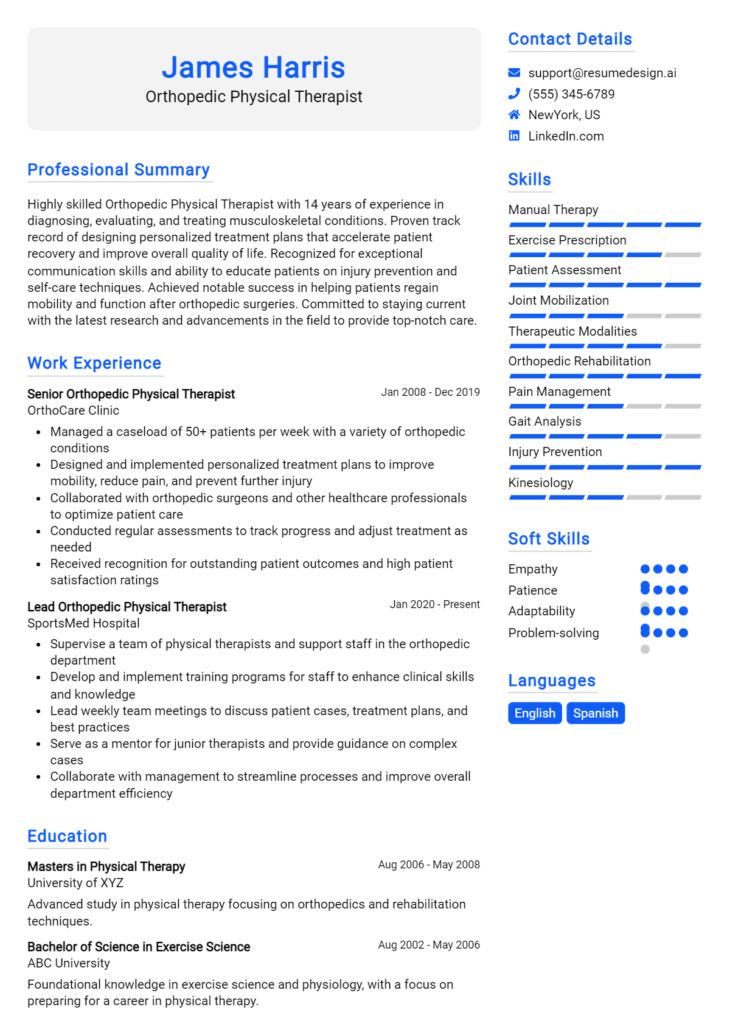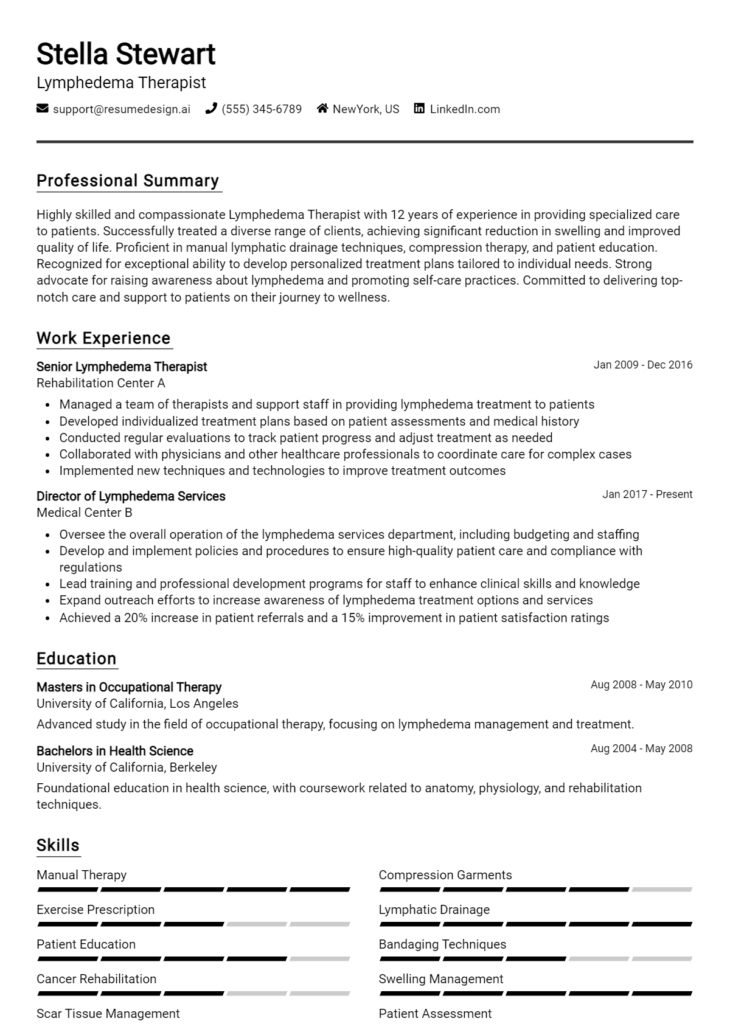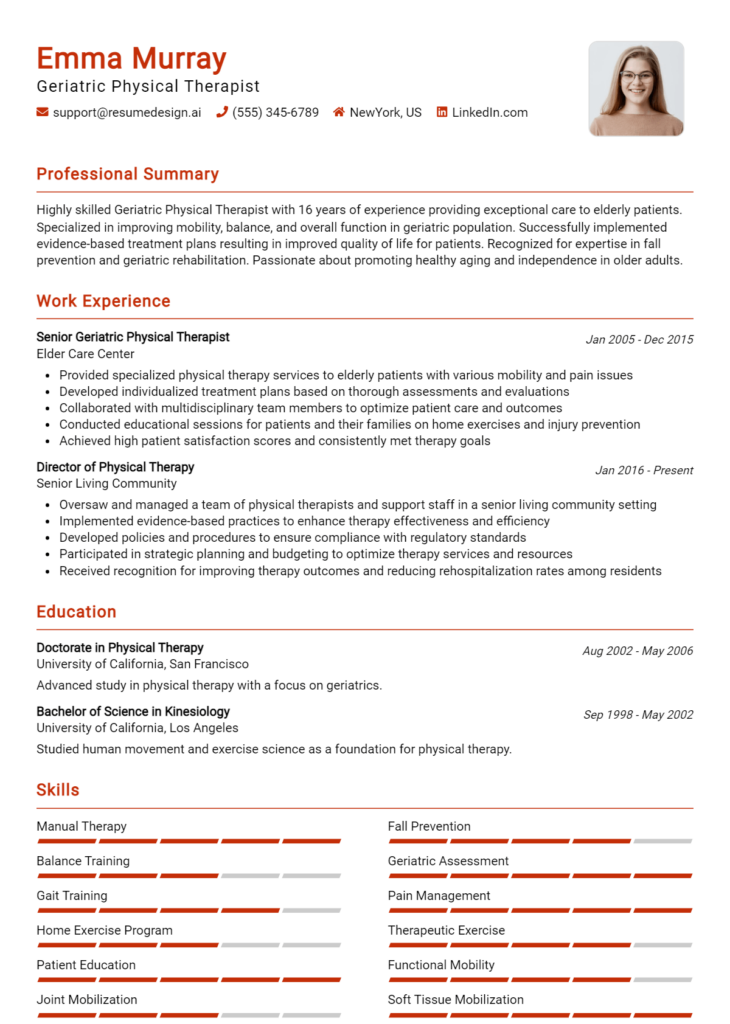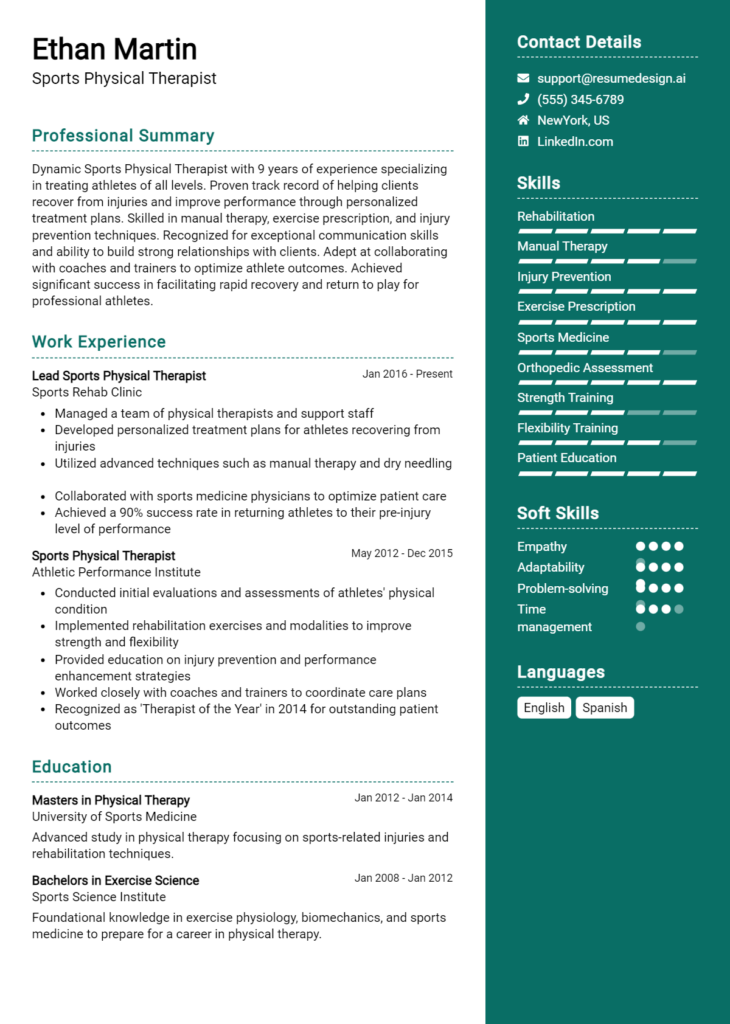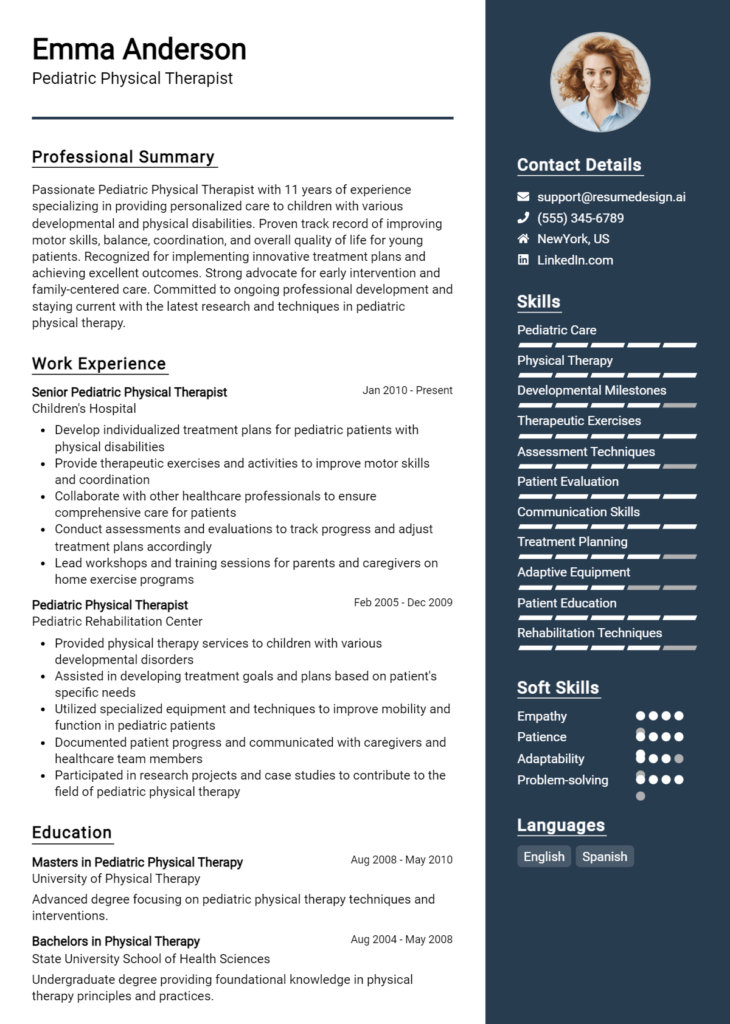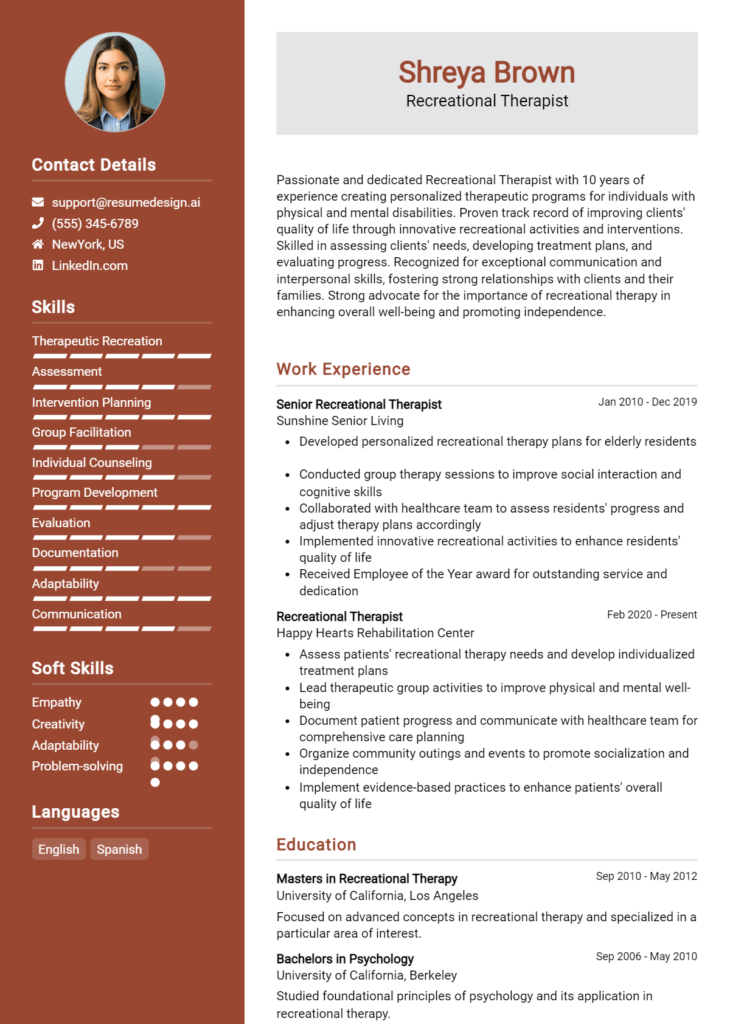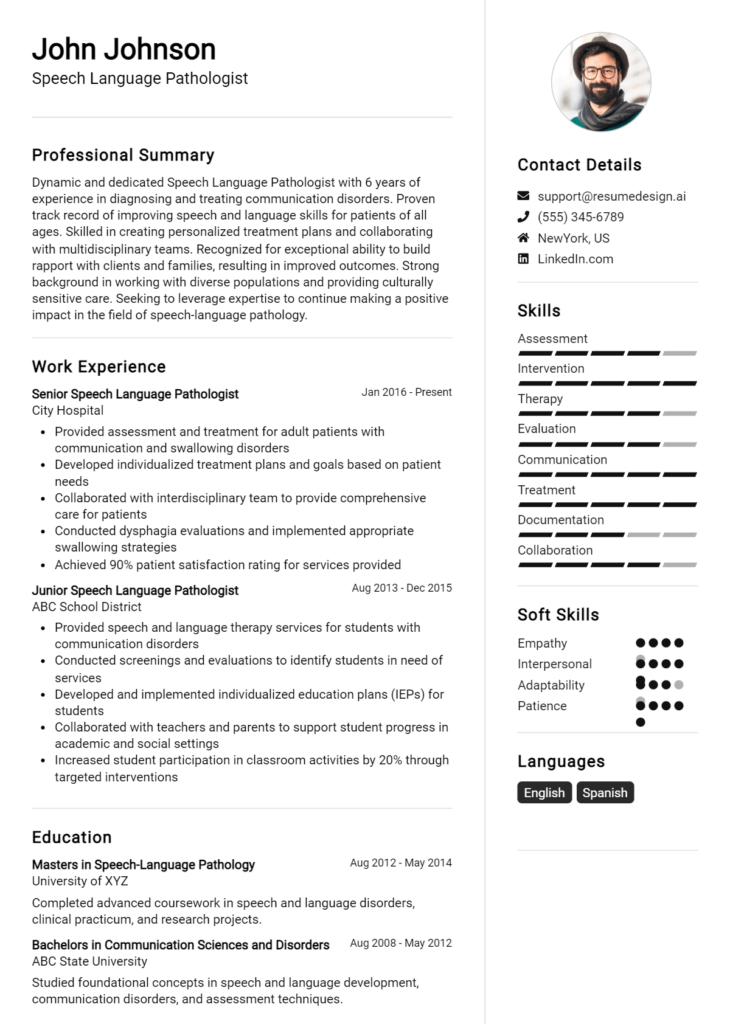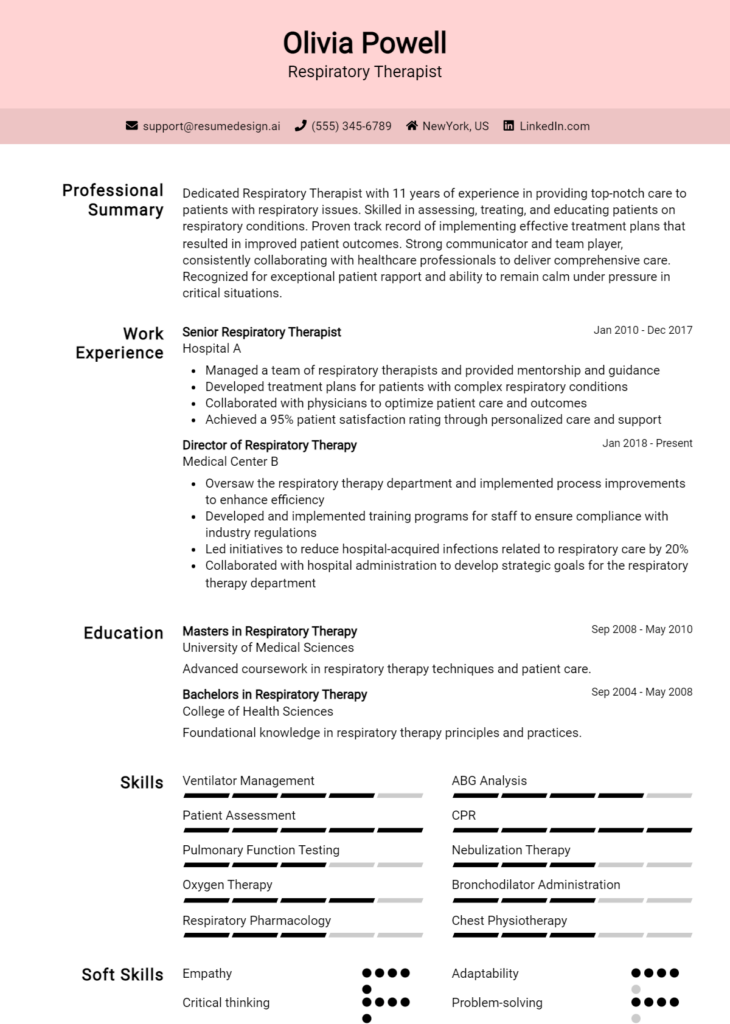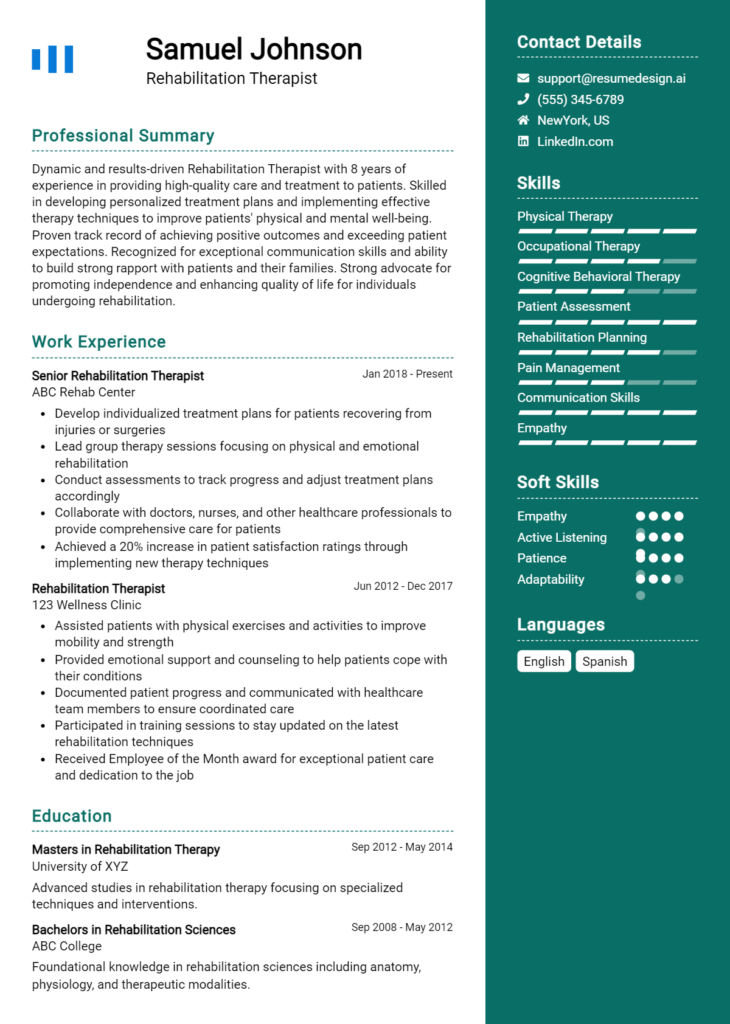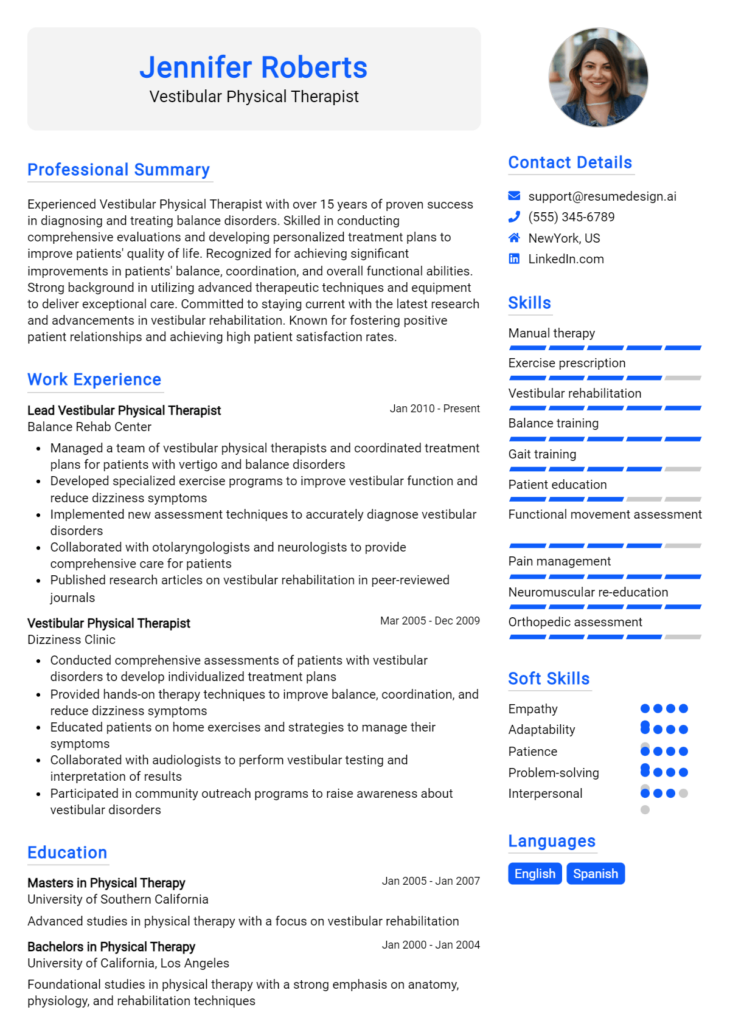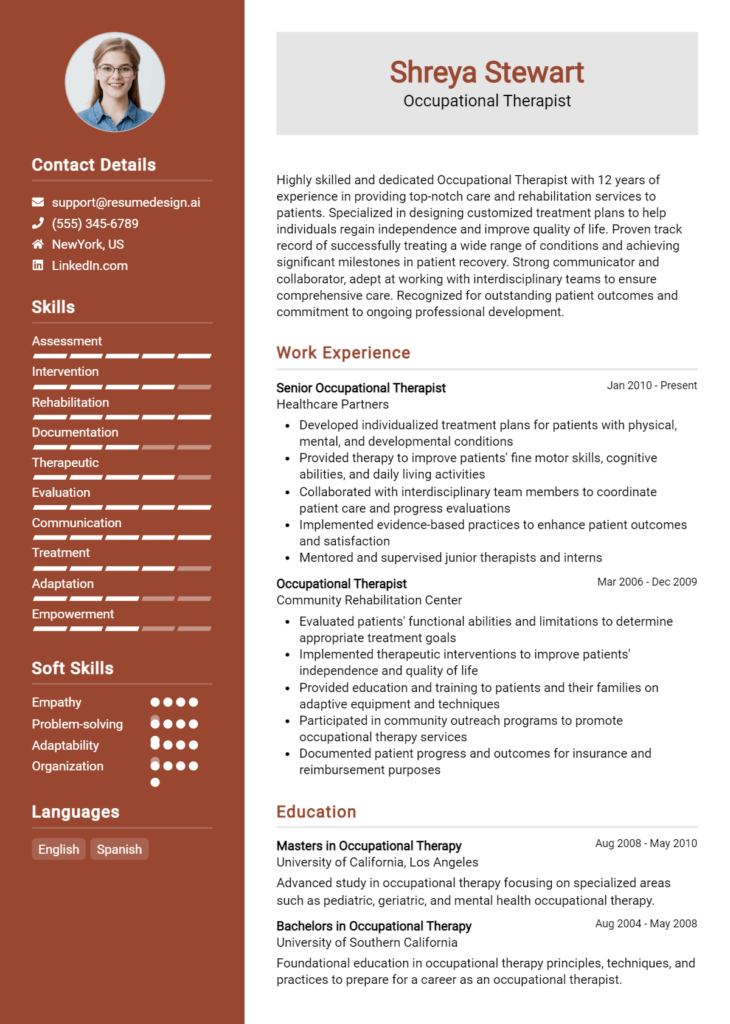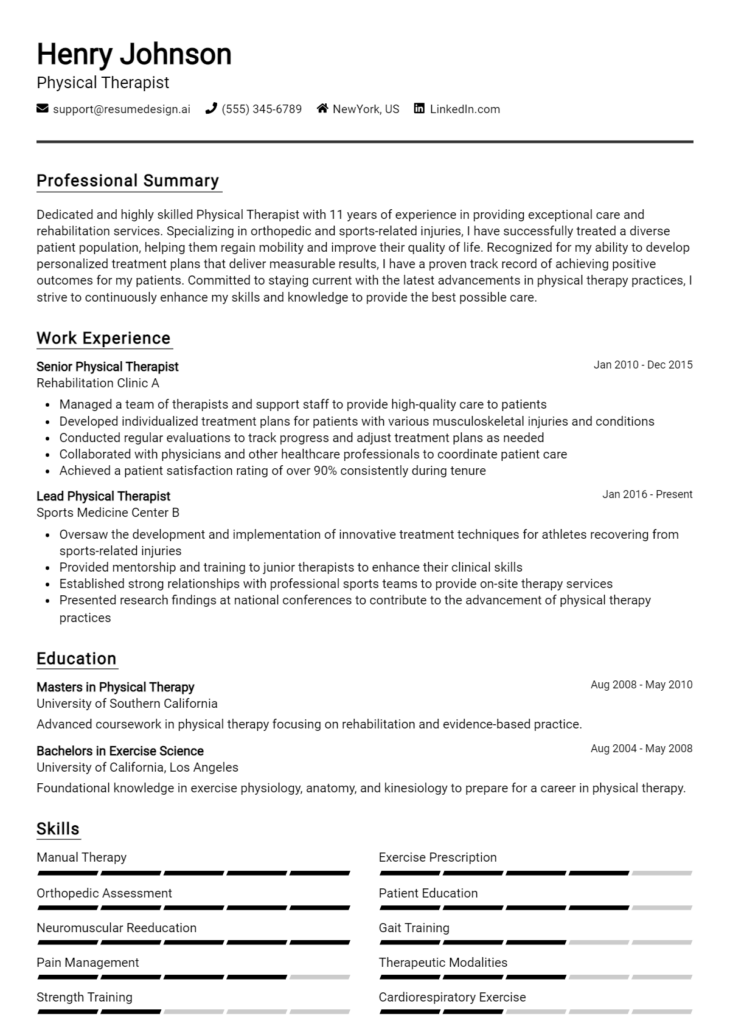Neurological Physical Therapist Core Responsibilities
A Neurological Physical Therapist plays a vital role in rehabilitating patients with neurological disorders, such as stroke or spinal cord injuries. Key responsibilities include conducting assessments, developing personalized treatment plans, and collaborating with interdisciplinary teams to enhance patient outcomes. Essential skills encompass strong technical knowledge, operational expertise, and advanced problem-solving abilities, which are crucial for navigating complex cases. A well-structured resume that highlights these qualifications can significantly contribute to organizational goals by ensuring effective patient care and improved functional independence.
Common Responsibilities Listed on Neurological Physical Therapist Resume
- Conducting comprehensive patient assessments and evaluations
- Developing individualized treatment plans based on patient needs
- Implementing therapeutic interventions to improve mobility and function
- Monitoring patient progress and modifying treatment strategies accordingly
- Educating patients and families on therapy goals and home exercises
- Collaborating with physicians, occupational therapists, and other healthcare professionals
- Maintaining accurate patient records and documentation
- Staying updated on latest research and best practices in neurological rehabilitation
- Participating in clinical supervision and training for junior staff
- Advocating for patient needs within the healthcare system
- Utilizing assistive devices and technologies to enhance therapy outcomes
High-Level Resume Tips for Neurological Physical Therapist Professionals
In the competitive field of Neurological Physical Therapy, a well-crafted resume serves as a critical tool for making a strong first impression on potential employers. This document is often the initial touchpoint that showcases a candidate's qualifications, skills, and achievements, and can significantly influence hiring decisions. A resume that effectively reflects a professional's expertise not only highlights their clinical skills but also demonstrates their commitment to patient care and rehabilitation. In this guide, we will provide practical and actionable resume tips specifically tailored for Neurological Physical Therapist professionals, helping you to stand out in a crowded job market.
Top Resume Tips for Neurological Physical Therapist Professionals
- Tailor your resume to match the specific job description, using keywords from the posting to align your skills with the employer's needs.
- Showcase relevant experience by prioritizing roles that highlight your expertise in neurological rehabilitation and patient care.
- Quantify your achievements by including metrics, such as the number of patients treated, improvements in mobility scores, or successful rehabilitation outcomes.
- Highlight industry-specific skills, such as knowledge of neurological conditions, assessment techniques, and therapeutic modalities.
- Incorporate continuing education and certifications relevant to neurological physical therapy to demonstrate your commitment to professional development.
- Use action verbs to describe your responsibilities and achievements, creating a dynamic and engaging narrative of your professional journey.
- Keep your resume concise, ideally one page, focusing on the most relevant and impactful information.
- Include a summary statement at the top that succinctly captures your experience, skills, and passion for neurological physical therapy.
- Proofread meticulously to eliminate any errors, ensuring your resume reflects professionalism and attention to detail.
By implementing these tips, you can significantly increase your chances of landing a job in the Neurological Physical Therapist field. A tailored and compelling resume will not only showcase your qualifications but also demonstrate your dedication to advancing your career in this rewarding specialty. Stand out to potential employers by presenting a resume that truly reflects your expertise and passion for helping patients achieve their rehabilitation goals.
Why Resume Headlines & Titles are Important for Neurological Physical Therapist
In the competitive field of neurological physical therapy, a well-crafted resume headline or title is crucial for capturing the attention of hiring managers. A strong headline serves as the first impression and an impactful summary of a candidate's key qualifications, skills, and experiences in just a few words. It should be concise, relevant, and tailored specifically to the job being applied for, allowing hiring managers to quickly assess the applicant's potential fit for the role. By effectively distilling one’s professional identity into a compelling phrase, candidates can stand out in a crowded job market and increase their chances of being noticed and considered for interviews.
Best Practices for Crafting Resume Headlines for Neurological Physical Therapist
- Keep it concise—aim for no more than 10-12 words.
- Use role-specific keywords that align with the job description.
- Highlight your most relevant qualifications or specializations.
- Incorporate measurable achievements when possible.
- Avoid jargon; use clear and straightforward language.
- Make it attention-grabbing by using action words or impactful phrases.
- Ensure it reflects your professional brand and career goals.
- Tailor the headline for each job application for relevance.
Example Resume Headlines for Neurological Physical Therapist
Strong Resume Headlines
Dedicated Neurological Physical Therapist with 10+ Years of Experience in Stroke Rehabilitation
Compassionate Neuro Rehab Specialist Focused on Patient-Centered Care and Functional Outcomes
Results-Driven Physical Therapist with Expertise in Neurological Disorders and Evidence-Based Practices
Licensed Neurological Physical Therapist Committed to Enhancing Quality of Life Through Innovative Treatment Strategies
Weak Resume Headlines
Physical Therapist
Experienced Therapist Seeking Job
Healthcare Professional with Skills
Strong headlines are effective because they are specific, focused, and showcase the candidate's unique strengths and experiences relevant to the neurological physical therapy field. They immediately convey a sense of professionalism and purpose, making a compelling case for why the candidate should be considered for the role. In contrast, weak headlines tend to be vague and generic, failing to provide any real insight into the applicant's qualifications or the value they bring to the position. This lack of specificity makes it difficult for hiring managers to see why a candidate would stand out, ultimately diminishing the chances of being noticed in a competitive landscape.
Writing an Exceptional Neurological Physical Therapist Resume Summary
A well-crafted resume summary is essential for a Neurological Physical Therapist, as it serves as the first impression for hiring managers. This brief yet powerful introduction encapsulates the candidate's key skills, relevant experience, and notable accomplishments in the field of neurological rehabilitation. A strong summary not only captures attention but also sets the tone for the rest of the resume, highlighting the therapist's expertise in treating patients with neurological disorders. It should be concise, impactful, and tailored to the specific job the candidate is applying for, ensuring that it resonates with the unique needs of the employer.
Best Practices for Writing a Neurological Physical Therapist Resume Summary
- Quantify achievements whenever possible to demonstrate impact, such as the percentage of patients who improved under your care.
- Focus on relevant skills that align with the job description, such as therapeutic techniques, patient assessment, and care planning.
- Tailor your summary for each job application to highlight the most pertinent experiences and skills.
- Use action verbs to convey a sense of proactivity and effectiveness in patient care.
- Keep it concise, ideally between 3-5 sentences, to maintain the reader's interest.
- Incorporate keywords from the job description to enhance compatibility with applicant tracking systems.
- Highlight any specialized training or certifications relevant to neurological rehabilitation.
- Showcase your passion for helping patients regain mobility and independence, which can resonate well with potential employers.
Example Neurological Physical Therapist Resume Summaries
Strong Resume Summaries
Dynamic Neurological Physical Therapist with over 8 years of experience in rehabilitative care, specializing in stroke recovery. Achieved a 90% success rate in helping patients regain mobility within six months of treatment, utilizing advanced therapeutic techniques and personalized care plans.
Compassionate and dedicated Neurological Physical Therapist with a proven track record of improving patient outcomes. Successfully implemented evidence-based interventions for over 150 patients, resulting in a 30% increase in functional independence scores.
Results-oriented Neurological Physical Therapist skilled in developing tailored rehabilitation programs. Demonstrated expertise in treating traumatic brain injury patients, with a 95% patient satisfaction rate and significant improvements in mobility and daily living activities.
Weak Resume Summaries
Experienced physical therapist looking for a position in neurological rehabilitation. I have worked with various patients and helped them improve.
Neurological Physical Therapist with some experience. I enjoy working with patients and helping them with their rehabilitation.
The examples of strong resume summaries stand out because they include specific achievements, quantify results, and demonstrate direct relevance to the role of a Neurological Physical Therapist. They highlight the candidate's skills and successes in a clear and impactful manner. In contrast, the weak resume summaries lack specificity and quantifiable outcomes, making them generic and less memorable. They fail to convey the candidate's unique qualifications or the value they can bring to a prospective employer.
Work Experience Section for Neurological Physical Therapist Resume
The work experience section of a Neurological Physical Therapist resume is a vital component that illustrates a candidate's practical knowledge and hands-on abilities in the field. This section not only showcases the technical skills essential for effective patient care but also highlights the therapist's capability to manage teams and deliver high-quality therapeutic services. By quantifying achievements and aligning experiences with industry standards, candidates can demonstrate their impact in previous roles, making it easier for potential employers to assess their qualifications and fit within the organization.
Best Practices for Neurological Physical Therapist Work Experience
- Highlight specific technical skills relevant to neurological rehabilitation, such as expertise in various therapeutic modalities.
- Quantify achievements with metrics that demonstrate patient progress, such as percentage improvements in mobility or functional independence.
- Showcase experience in interdisciplinary collaboration, emphasizing teamwork with physicians, nurses, and occupational therapists.
- Include leadership roles, such as mentoring junior staff or leading treatment teams, to illustrate management capabilities.
- Detail your involvement in patient education and community outreach programs, demonstrating a commitment to holistic care.
- Tailor the work experience descriptions to match the job requirements outlined in the job posting, ensuring alignment with industry standards.
- Use action verbs and concise language to convey achievements effectively and engage the reader.
- Maintain a clear chronological format that allows for easy navigation through your professional history.
Example Work Experiences for Neurological Physical Therapist
Strong Experiences
- Led a multidisciplinary team in developing individualized treatment plans for over 50 patients, resulting in a 30% increase in overall patient satisfaction scores.
- Implemented a new therapeutic protocol for stroke rehabilitation that improved patient mobility by an average of 25% within three months.
- Conducted community workshops on neurological health, reaching over 100 participants and enhancing public awareness about stroke prevention and recovery.
- Mentored five junior physical therapists, fostering professional growth and enhancing team efficacy, which led to a 15% improvement in service delivery metrics.
Weak Experiences
- Worked with patients in a clinical setting, helping them with various therapies.
- Participated in team meetings to discuss patient progress occasionally.
- Assisted in administrative tasks related to patient care without specific achievements noted.
- Provided therapy services as needed without any measurable outcomes or strategies mentioned.
The strong experiences listed above are considered effective because they provide quantifiable results, demonstrate leadership, and exhibit collaboration within a team setting, all of which are crucial in the role of a Neurological Physical Therapist. In contrast, the weak experiences lack specificity, measurable outcomes, and detailed descriptions of responsibilities, which fail to capture the candidate's true impact and capabilities in their previous roles.
Education and Certifications Section for Neurological Physical Therapist Resume
The education and certifications section of a Neurological Physical Therapist resume is crucial as it serves to showcase the candidate's academic background and professional qualifications. This section highlights the candidate's commitment to the field through relevant degrees, industry-recognized certifications, and ongoing educational efforts. By providing details on relevant coursework, specialized training, and certifications, candidates can significantly enhance their credibility and demonstrate their preparedness for the specific demands of the job role. This not only reflects their foundational knowledge but also their dedication to continuous learning in a rapidly evolving field.
Best Practices for Neurological Physical Therapist Education and Certifications
- Include only relevant degrees and certifications that align with neurological physical therapy.
- List certifications in order of importance, starting with the most recognized by employers.
- Provide details on specialized training or workshops related to neurological therapy.
- Include relevant coursework that showcases specific skills or knowledge applicable to the role.
- Highlight advanced degrees (e.g., Doctorate in Physical Therapy) or additional qualifications (e.g., board certification in neurological physical therapy).
- Keep formatting consistent and professional to enhance readability.
- Use clear and concise language that communicates qualifications effectively.
- Update this section regularly to reflect new certifications or training undertaken.
Example Education and Certifications for Neurological Physical Therapist
Strong Examples
- Doctor of Physical Therapy (DPT), University of Health Sciences, 2021
- Board Certified Neurological Clinical Specialist (NCS), American Physical Therapy Association, 2022
- Advanced Neurological Rehabilitation Certification, 2023
- Relevant Coursework: Neuroanatomy, Neurological Rehabilitation Techniques, Patient Assessment in Neurology
Weak Examples
- Bachelor of Arts in Psychology, University of Arts, 2015
- Basic First Aid Certification, 2020
- Online Course in General Fitness Training, 2021
- High School Diploma, 2010
The strong examples are considered relevant because they demonstrate a direct alignment with the requirements of a Neurological Physical Therapist, showcasing advanced degrees and specialized credentials that are respected in the field. In contrast, the weak examples lack relevance to the role, as they highlight outdated or unrelated qualifications, such as a non-physical therapy degree or certifications that do not pertain to neurological practice, which could undermine the candidate's suitability for the position.
Top Skills & Keywords for Neurological Physical Therapist Resume
As a Neurological Physical Therapist, possessing a diverse set of skills is crucial for effectively treating patients with neurological disorders. A well-crafted resume that highlights both hard and soft skills can significantly enhance a therapist's employability. Hard skills demonstrate technical proficiency and clinical knowledge, while soft skills reflect interpersonal abilities and emotional intelligence. Together, these skills enable therapists to design personalized rehabilitation programs, improve patient outcomes, and foster a supportive therapeutic environment. Therefore, it is essential to carefully curate and present these skills in a resume to stand out in a competitive job market.
Top Hard & Soft Skills for Neurological Physical Therapist
Soft Skills
- Empathy
- Communication
- Patience
- Problem-solving
- Teamwork
- Adaptability
- Active listening
- Critical thinking
- Attention to detail
- Compassion
- Motivational skills
- Cultural competence
- Time management
- Conflict resolution
- Stress management
Hard Skills
- Neurological assessment techniques
- Manual therapy skills
- Therapeutic exercise prescription
- Knowledge of neuroplasticity
- Gait training
- Assistive device training
- Patient education strategies
- Electrotherapy modalities
- Balance and coordination training
- Clinical documentation and reporting
- Familiarity with EMR systems
- Rehabilitation program development
- Understanding of pharmacology related to neurological disorders
- Knowledge of functional movement analysis
- Proficiency in outcome measurement tools
- Experience with multidisciplinary collaboration
- Evidence-based practice implementation
For a deeper understanding of the importance of skills and how to effectively highlight your work experience, consider exploring additional resources that can further enhance your resume.
Stand Out with a Winning Neurological Physical Therapist Cover Letter
I am writing to express my enthusiasm for the Neurological Physical Therapist position at [Company Name], as advertised on [where you found the job listing]. With a Doctorate in Physical Therapy and over [X years] of experience specializing in neurological rehabilitation, I am confident in my ability to provide exceptional care and contribute to your team. My passion for helping patients regain their independence and improve their quality of life drives my commitment to staying updated with the latest evidence-based practices and rehabilitation techniques.
In my previous role at [Previous Employer], I successfully developed and implemented individualized treatment plans for patients with a variety of neurological disorders, including stroke, traumatic brain injury, and multiple sclerosis. Collaborating closely with interdisciplinary teams, I assessed patient progress and adjusted treatment modalities as needed to ensure optimal outcomes. My hands-on experience with advanced therapeutic techniques, such as constraint-induced movement therapy and functional electrical stimulation, has equipped me with the skills necessary to tackle the unique challenges presented in neurological rehabilitation.
I pride myself on my strong communication skills, which allow me to build rapport with patients and their families, fostering a supportive environment for healing. I believe in empowering patients through education about their conditions and treatment options, ensuring they are active participants in their recovery journey. Additionally, my dedication to professional development has led me to pursue continuing education opportunities, including [mention any relevant certifications or courses], enhancing my ability to provide the highest level of care.
I am excited about the opportunity to bring my expertise to [Company Name] and contribute to the exceptional care you provide to your patients. I look forward to discussing how my background, skills, and passion for neurological rehabilitation align with the goals of your team. Thank you for considering my application; I hope to speak with you soon.
Common Mistakes to Avoid in a Neurological Physical Therapist Resume
When crafting a resume for a Neurological Physical Therapist position, it’s essential to present your qualifications and experiences clearly and effectively. However, many candidates make common mistakes that can undermine their chances of landing an interview. Avoiding these pitfalls will not only enhance the professionalism of your resume but also ensure that your skills and experiences are showcased in the best possible light.
Neglecting Keywords: Failing to incorporate relevant keywords from the job description can lead to your resume being overlooked by Applicant Tracking Systems (ATS). Make sure to include specific terms related to neurological therapy and rehabilitation.
Overloading with Jargon: While it’s essential to demonstrate your expertise, using too much technical jargon can alienate those reviewing your resume. Aim for clarity and ensure that your language is accessible to both clinical and non-clinical readers.
Ignoring Formatting: A cluttered or unprofessional layout can distract from your qualifications. Use a clean, organized format with clear headings, bullet points, and consistent font styles to enhance readability.
Lack of Specificity: Generalized statements about your experience can make your resume forgettable. Instead, quantify your achievements with specific examples, such as the number of patients treated or improvements in patient outcomes.
Omitting Continuing Education: The field of neurological therapy is constantly evolving. Failing to mention relevant certifications, workshops, or courses can give the impression that you are not committed to ongoing professional development.
Inadequate Focus on Soft Skills: While clinical skills are vital, soft skills like communication, empathy, and teamwork are equally important in therapy settings. Ensure you highlight these attributes alongside your technical skills.
Unprofessional Email Address: Using an unprofessional or outdated email address can create a negative first impression. Always opt for a simple, professional email that includes your name.
Neglecting to Tailor the Resume: Sending out a generic resume can be detrimental. Always customize your resume for each job application to reflect the specific requirements and expectations of the position you’re applying for.
Conclusion
As a Neurological Physical Therapist, you play a crucial role in helping patients recover and improve their quality of life after neurological events such as strokes, traumatic brain injuries, or spinal cord injuries. Throughout this article, we've explored the essential skills and qualifications needed for this role, including a deep understanding of neuroanatomy, proficiency in therapeutic techniques, and the ability to create personalized rehabilitation plans.
We also discussed the importance of continuous education and staying updated with the latest advancements in neurological therapy to provide the best care possible. Networking with other professionals in the field and engaging in interdisciplinary collaboration can further enhance your practice and patient outcomes.
In conclusion, if you're looking to advance your career as a Neurological Physical Therapist, it's vital to ensure that your resume reflects your qualifications and experiences accurately. Take a moment to review your resume and consider using available resources to enhance it. Tools such as resume templates, resume builder, resume examples, and cover letter templates can provide you with the guidance and structure needed to create a compelling application that stands out to employers. Start today and take the next step in your professional journey!

